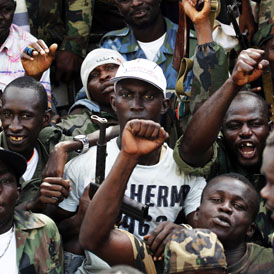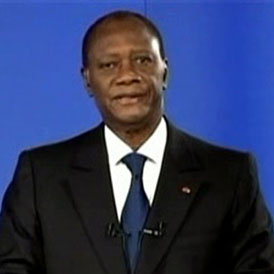Ouattara: Financial questions and ‘the bleeding of Africa’
President Alassane Ouattara’s history in the government of Ivory Coast is marked by financial questions and “the bleeding of Africa”, a leading Ivorian academic tells Channel 4 News.

When Laurent Gbagbo was captured the world sighed with relief, but critics of the new President of Ivory Coast, Alassane Ouattara, claim his unelected reign in the early 1990s was a “disaster” for the country.
“I was with ADO [Alassane Ouattara’s initials] the moment he heard Gbagbo was captured,” one of Ouattara’s supporters – Syed Toure – told Channel 4 News.
“A gentle smile came over his face as one of his people gave him the news. He had been waiting for this moment for many years.”
That smile represented the final stages of a conflict that has consumed more than 1,000 lives and displaced over a million people. What had – apparently – started with a disputed election result ended with familiar pictures of a humiliated dictator paraded on state television.
“He had been waiting for this moment for many years.” Ouattara supporter Syed Toure
But the capture of Laurent Gbagbo to his great adversary Ouattara was merely the latest instalment of an epic saga that has lasted for more than two decades – fracturing the country along ethnic, religious and economic lines.
Ouattara’s great task is now to unite the north and south, but critics who remember his premiership from 1990-1993 say he is not the great statesmen that the international community portrays him to be.
After studying in the United States and working at the IMF from 1968 to 1973, Ouattara took a number of positions at the Central Bank of West African States.
In 1990 Ivory Coast’s ailing President-for-life, Felix Houphouet Boigny, invited Ouattara to address the country’s stagnant economy. It marked “the beginning of the end”, according to the renowned Ivorian academic and author Dr Martial Frindethie.
As Boigny’s health deteriorated further, Ouattara was allowed to consolidate the portfolios of Prime Minister, Minister of Finance, and Interim President, without an election. He then began to “liberalise” the economy by privatising the state’s assets in line with World Trade Organisation recommendations.
“He instituted the World Bank and IMF’s structural adjustment programmes to the letter,” Dr Frindethie told Channel 4 News.
Read our Special Reports Ivory Coast: divided nation

During his term, Ouattara reportedly oversaw an estimated $22billion of capital flight from the Ivory Coast to foreign shores.
“As a result of Ouattara’s collusion with French businessmen, 27 per cent of the assets of Ivorian enterprises were French owned; 240 subsidiaries and more than 600 companies belonged to French businessmen, representing 68 per cent of direct foreign investments in the Ivory Coast,” according to Dr Frindethie.
At the same time, it’s alleged that Ouattara ordered all public receipts to be transferred from the treasury directly to an account at the office of the Prime Minister, “mixing public and individual assets with state property for the first time, making him one of the richest men on earth,” according to Dr Frindethie.
A spokesman for Ouattara denied “in the strongest terms” any improper financial accounting during this period. The Ivorian Ministry of Finance was unavailable for comment.
‘Questionable financial transactions’
After what Dr Frindethie called “Ouattara’s questionable financial transactions”, the former IMF economist went on to cut subsidies to Ivorian farmers – at the same time as the EU was heavily backing European farmers with huge subsidies – and caused living standards in rural areas to plunge.
His scaling back of the state meant 10,000 state employees were instantly dismissed, and those who kept their jobs had their salaries cut by half.
“Good governance has nothing to do with the Structural Adjustment Policies, it is about the economic domination and the bleeding of Africa,”said Dr Frindethie.
Welfare budgets were slashed, healthcare services cut, and education grants were frozen. It caused mass student protests on the streets of Abidjan and elsewhere – protests that were put down violently by the army under its head Robert Guei.
It’s claimed that hundreds of students “disappeared”, and union and opposition leaders – including Laurent Gbagbo – were jailed and tortured by Guei’s secret police.
In 1991 Ouattara married Boigny’s former mistress, the Algerian-French businesswoman Dominique Folleroux. It’s widely reported that the then Mayor of Neuilly – a Mr Nicolas Sarkozy – officiated at the ceremony, but Sarkozy has always denied the claim.
Dominique Folleroux is said to have engineered the deal for French billionaire industrialists Martin Bouygues and Vincent Bolloré to acquire the Ivorian state-owned energy company (the EECI) and water company (SODECI) “below their market value”, according to Dr Frindethie.
In 1993, Boigny died and under the Ivorian constitution power was handed over to the leader of the National Assembly, Henri Konan Bedie, so ending Ouattara’s term in government, but not his presidential ambitions.
-
Latest news
-
Boy with profound learning disabilities reaches out of court settlement after abuse in residential school7m

-
India election: Modi rivals hit by string of raids and arrests7m

-
Can UK’s abandoned mines be used to build a greener future?5m

-
Sycamore Gap: Man pleads not guilty to felling iconic tree2m

-
‘Child poverty has not fallen since Tories came in’, says Gordon Brown5m

-




